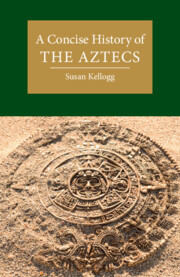Book contents
- A Concise History of the Aztecs
- Cambridge Concise Histories
- A Concise History of the Aztecs
- Copyright page
- Dedication
- Contents
- Figures
- Maps
- Tables
- Preface
- Key Periods and Dates
- 1 Introduction
- 2 Living in the Aztecs’ Cosmos
- 3 Communities, Kingdoms, “Empires”
- 4 Creating Value
- 5 Sex and the Altepetl
- 6 Resilience
- 7 Resilience
- Glossary
- Bibliographic Essay
- Index
6 - Resilience
Part One: Aztec Intellectual Life
Published online by Cambridge University Press: 08 February 2024
- A Concise History of the Aztecs
- Cambridge Concise Histories
- A Concise History of the Aztecs
- Copyright page
- Dedication
- Contents
- Figures
- Maps
- Tables
- Preface
- Key Periods and Dates
- 1 Introduction
- 2 Living in the Aztecs’ Cosmos
- 3 Communities, Kingdoms, “Empires”
- 4 Creating Value
- 5 Sex and the Altepetl
- 6 Resilience
- 7 Resilience
- Glossary
- Bibliographic Essay
- Index
Summary
Aztecs were brilliant scientists, writers, and artists. Medicine is an example of their scientific activities. They developed ideas about the causes of illness, practical and supernatural. Priests and priestesses were involved in curing, but Aztecs had an array of healers. The most commonly used term by Aztecs for a doctor – someone with specific and practical knowledge about healing – was “ticitl,” female and male. That Aztecs wrote is not widely recognized. They used writing to name people, titles, places, and deities. Not merely pictography, their writing is complex and developed from the late prehispanic period into the colonial period. Their books recorded calendars, history, tribute payments, and succession to rulerships. They also created a rich oral literature, often expressed through songs. Many were ancient, others composed in the early colonial period. Those that became written in alphabetized Nahuatl dealt with deities, temples, flowers, lords, war, sexuality, even conquest and Christian worship. Also great artists, they were influenced by the art of earlier peoples and the Mixteca-Puebla style and worked in several media: architecture; monumental and small-scale stone sculptures; books; precious stones and gold work; textiles; dough sculptures; and paper. This art expressed an official ideology as well as resistance to it.
- Type
- Chapter
- Information
- A Concise History of the Aztecs , pp. 202 - 245Publisher: Cambridge University PressPrint publication year: 2024

